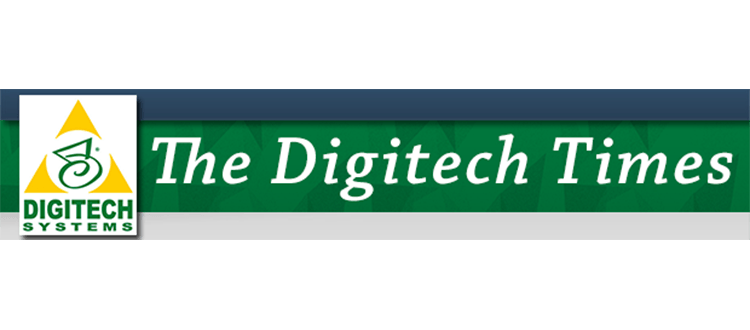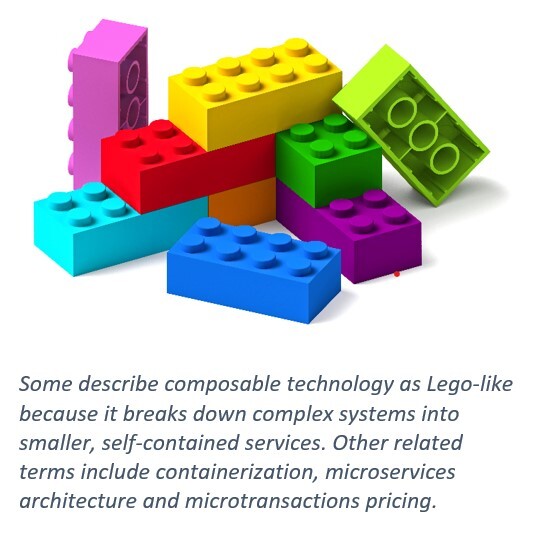Grab Your Piece of the Composable Tech Market
How can you as a technology seller capitalize on the shift to composable technology? Learn more about this emerging trend and get sales strategies you can use to prosper.

GRAB YOUR PIECE OF THE COMPOSABLE TECH MARKET
As a technology seller, how can you capitalize on the shift to composable technology? For starters, gaining an understanding of this new approach to cloud software development and purchasing is important. You’ll also likely need to adjust your
business model.
Keep reading to learn more about composable technology and to get a list of strategies to help you succeed as part of this important change in the tech industry. In support of your efforts, the sales and marketing team at Digitech Systems will keep working to provide you sales tips, product updates and other information.
What is composable technology?
Composable technology is a term used to describe the emerging trend where businesses and other organizations “compose” their own software solutions and, going a step further, pay only for the services when used. Related terms include microtransactions (similar to pay-per-click or pay-per-use), microservices architecture and containerization. An example of composable technology is Digitech Systems’ new robotic process automation (RPA) technology that costs only pennies per hour used.
For your customers, the shift to composable tech may remind them of the shift to streaming TV. They choose—and pay for—only the services they want. No more requirement to buy all-in-one packages (where up to 80% of software is rarely or never used.)

For Digitech Systems and other tech developers, composable technology frees them to focus more on their specific areas of expertise and interest in order to get software advancements—particularly for cloud services—in customers’ hands faster and at a lower cost.
How can you as a technology seller adjust to the shift to composable tech?
For many technology sellers, success in the composable tech era will require an adjustment. As our Christina Robbins notes in
this recent The Imaging Channel article, “Much like the move to cloud services, you’ll need to adjust your product lineup, and those who move quickly into this trend will reap the biggest benefit.” For those who don’t adapt, profits will get harder to come by, experts say.
Here are some of the ways technology sellers can position themselves to keep prospering, according to industry experts:
Product offerings and differentiation: Expand your product offerings by adding composable tech solutions, component libraries and tools for easy integration and customization. Companies that adapt will stand out and attract customers looking for composable solutions.
Sales and marketing strategies: Implement sales and marketing strategies to effectively communicate the benefits of composable technology. Highlighting the agility, scalability, and innovation potential resonates with businesses seeking to stay current with evolving digital technology.
Customer engagement: Engage customers in more consultative discussions. Instead of focusing only on pre-packaged solutions, collaborate with clients to design tailored systems from modular components. You’ll better address their specific needs. You’ll also foster long-term partnerships.
Education and training: Keep learning yourself and play an active role in educating your customers about the benefits, implementation and best practices of composable technology. Offer training programs and resources to empower customers to make informed decisions. Provide staff training.
Partnerships: Build on your partnerships with Digitech Systems and other technology providers to create a robust ecosystem of compatible components. Collaborate with vendors, integrators and developers to offer comprehensive solutions.
Pricing models: Adjust your pricing models to accommodate the pay-per-use fee structure—also known as microtransactions-based pricing—that is a key aspect of composable technology. Related models to explore include subscription-based models, pay-as-you-go pricing or component-specific pricing.
Support and maintenance: With composable technology, customers will seek out custom configurations based on their needs. Technology sellers can profit by offering tailored support and maintenance services.
Innovation and R&D: Stay current on the latest research and product developments to continually expand your offerings. Staying innovative and offering cutting-edge components will attract more customers.
Data privacy and security: Instill confidence by prioritizing the data privacy and security benefits of composable technology.
Customization vs. complexity: Strike the right balance of customization and complexity by staying flexible and making sure the process of selecting and integrating components isn’t overwhelming.
The buzz over composable tech continues to build. Don’t wait to start adjusting your strategies. For more information on composable tech and related areas such as containerization and microservices architecture, watch this brief presentation, Two Question Tuesday: Do You Know About Containerization Yet? - Digitech Systems, LLC.
________________________________________
Digitech Systems Sales and Marketing